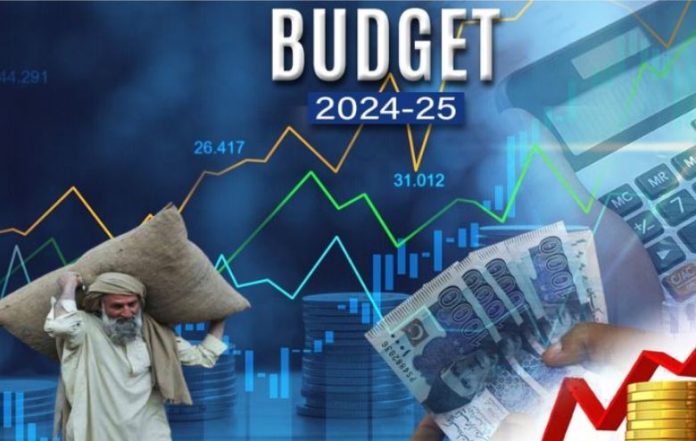ISLAMABAD, JUN 12: The coalition government will present the country’s budget for the fiscal year 2024-25 today as it looks to strengthen the case for a new bailout deal with the International Monetary Fund (IMF).
According to state-run Radio Pakistan, Finance Minister Muhammad Aurangzeb is expected to present the budget — the country’s financial plan outlining proposed expenditures and the means of financing them — in the National Assembly shortly.
The finance minister will then lay a copy of the Finance Bill 2024 before the Senate, which is expected to convene at 6pm.
As per the government’s tentative plan, a general debate on the budget would start on June 20 and would continue till June 24. The members will take part in the debate and voting on cut motions on June 26 and 27 whereas the budget will be passed on June 28.
A day earlier, the government unveiled the Pakistan Economic Survey 2023-24, which showed that the economy failed to meet most of its targets set in the previous budget due to challenging conditions. The agriculture sector, however, achieved unprecedented growth.
But the comments made by the finance minister yesterday hinted at a renewed focus on taxing untaxed
On Monday, the National Economic Council (NEC) — comprising Prime Minister Shehbaz Sharif, Deputy PM Ishaq Dar, the four chief ministers and the defence, finance, and planning ministers — approved a Rs3.792 trillion federal Public Sector Development Programme — more than 47pc increase compared to the previous FY.
Last week, it was reported that the finance ministry and the IMF were locked in last-minute talks ahead of the budget as the global lender put forward some tough conditions.
The IMF’s key demands include an increase in the tax revenue target, withdrawal of subsidies, taxes on the agriculture sector, increase in levy and taxes on power, gas and oil sectors, privatisation of sick government organisations and units and improving administration, a ministry official said.
Meanwhile, economist Sakib Sherani said the budget would be in line with IMF requirements but cautioned, “However, the real problem will be adherence to fiscal austerity and prudence and containment of populism.”
Ahead of the budget presentation, PM Shehbaz also chaired a meeting on the “rightsizing of the government”, the government’s official X account stated.
According to state broadcaster PTV News, a committee constituted for the purpose presented a preliminary report before the premier.
The report, containing short-term and mid-term recommendations, proposed shutting down a few state-owned enterprises, merging several others and handing some to the provinces, PTV News reported.
The committee further recommended that all such posts vacant for more than a year be abolished and that government officials’ “unnecessary travel” be prohibited while teleconferencing be encouraged.
Subsequently, the prime minister formed a high-powered committee to furnish a comprehensive report within 10 weeks on the said proposals.
Agriculture only saving grace in otherwise dismal year
According to the PES, the strong 6.25 per cent expansion in the agriculture sector — said by the report to be the highest in 19 years — drove Pakistan’s GDP growth by an expected 2.38pc in FY2024, recovering from a contraction of 0.21pc in the previous year.
The report said fiscal discipline was maintained, with a fiscal deficit of 3.7pc of GDP and a primary surplus of 1.5pc of GDP. Total revenues, meanwhile, grew by 41pc, driven by non-tax revenues and improved tax collection.
The State Bank of Pakistan, meanwhile, kept a tight monetary policy, with a 22pc policy rate, helping to ease inflation to 26pc from 28.2pc last year.
The current account deficit narrowed by 87.5pc to $0.5 billion compared to $4.1bn last year, and gross foreign exchange reserves increased to $8.0bn.
However, the PES noted a decline in the investment-to-GDP ratio, sluggish large-scale manufacturing, and high public debt.
It further revealed that cash-strapped Pakistan witnessed the highest-ever single-year increase in tax exemptions or concessions, surging by 73.24pc compared to the previous year to dole out a record Rs3.879tr.
During the presentation, Aurangzeb hinted at letting “no sacred cow” escape without paying due taxes through the budget for FY2024-25. He expressed confidence in beginning the next fiscal year on a stronger note, backed by the IMF’s support.
Speaking less on the performance of each economic sector and their sub-sectors, the finance minister stressed focusing on reforming the revenue system, energy sector, and state-owned enterprises (SOEs), reiterating that there were no strategic SOEs.
















